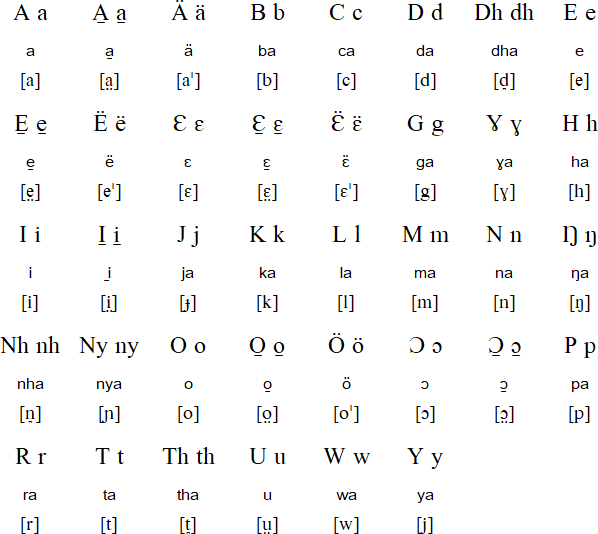Nuer is a member of the Western Nilotic group of the Nilo-Saharan languages. It spoken in South Sudan, particularly in the states of Jonglei, Unity, Upper Nile, Northern Bahr al Ghazal and Warrap. There are also Nuer speakers in the Gambela region in western Ethiopia. There are about 1.5 million speakers of Nuer in South Sudan, and another 154,000 in Ethiopia.
Nuer is also known as Naadh or Naath. Dialects of include Dor, Eastern Jikany, Abigar, Western Jikany, Cien, Thognaath, Lou, Nyuong, Thiang, Bul Chol, Gawaar, Jagei, Laak, Leek and Dok.
Nuer is written with a version of the Latin alphabet using an orthography adopted at the Rejaf Language Conference in 1928. This has been modified to some extent by missionaries since then.
Nuer is taught as a subject and used as a language of instruction in some primary schools in South Sudan. There is some written material in the language, including a dictionary and translations of the Bible.

Source: https://www.sil.org
Download an alphabet chart for Nuer
Corrections by Michael Peter Füstumum
Hear the Nuer alphabet:
Naath dial diethɛ kɛ a lɔr kä päärkɛ kɛ ciaŋ malä a mäni cuŋkiɛn. Tekɛ kɛ car kɛnɛ nhok ti de lät kɛ raan kɛ dämaan a gɔa.
All human beings are born free and equal in dignity and rights. They are endowed with reason and conscience and should act towards one another in a spirit of brotherhood.
(Article 1 of the Universal Declaration of Human Rights)
Information about Nuer | Numbers | Tower of Babel
Information about the Nuer language
http://en.wikipedia.org/wiki/Nuer_language
https://www.ethnologue.com/language/nus
http://www.dlib.indiana.edu/collections/nuer/
https://www.nuerlexicon.com/language.php
Acholi, Adhola, Alur, Anuak, Ateso, Bari, Belanda Bor, Datooga, Dholuo, Dinka, Dongotono, Kakwa, Karamojong, Keiyo, Kipsigis, Kuku, Kupsabiny, Lango (South Sudan), Lango (Uganda), Lopit, Lotuko, Maasai, Mandari, Markwet, Nandi, Nuer, Nyangatom, Nyepu, Terik, Toposa, Tugen, Turkana
Page last modified: 17.09.24
[top]
You can support this site by Buying Me A Coffee, and if you like what you see on this page, you can use the buttons below to share it with people you know.

If you like this site and find it useful, you can support it by making a donation via PayPal or Patreon, or by contributing in other ways. Omniglot is how I make my living.
Note: all links on this site to Amazon.com, Amazon.co.uk
and Amazon.fr
are affiliate links. This means I earn a commission if you click on any of them and buy something. So by clicking on these links you can help to support this site.
[top]